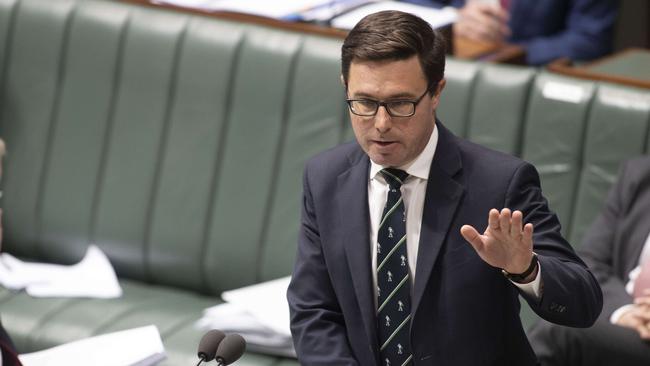ANZ’s climate deadline sparks political bunfight
Debate on ANZ’s new climate policy reached a fever pitch on Thursday, as government ministers denounced the move.

Debate about ANZ’s new climate policy reached fever pitch on Thursday, as government ministers denounced the move but the bank said it reflected prudent risk management and global best practice.
ANZ’s climate change statement on Thursday said the lender would impose low-carbon deadlines for the agriculture, food and beverage, building, energy and transport sectors as it ramped up support for the Paris Agreement goal of net zero emissions by 2050.
The move, while not aimed at family farms, sparked anger from Agriculture Minister David Littleproud who labelled the policy “disgraceful”.
“Banks are not and should not try to become society’s moral compass and arbiter — the Australian people decide that by who they elect,” he said, while threatening to revisit ANZ’s access to a government guarantee that protects deposits of up to $250,000.
“The Nationals will review every policy lever at the federal government’s disposal — including the availability of deposit guarantees — to protect Australian farmers from these sorts of arbitrary boardroom ideological agendas,” Mr Littleproud said.

But ANZ chief executive Shayne Elliott stood by the policy on Thursday, saying it reflected global best practice.
“We want to be respectful of the customers we have banked over our long history but also we need to prepare the bank for the future, and in our view this is good old-fashioned risk management. There is a change afoot,” he said.
“This is about working with the largest 100 emitters in the country; this is not to do with family farms.”
ANZ sees a huge opportunity in the sustainable finance sector, joining the likes of Macquarie Group and other rivals that are pushing further into the space.
Under its 10-year strategy, released to coincide with the bank’s annual result, ANZ said it would “move away from working with customers that don’t have clear and public transition plans”.
Separately, Mr Elliott questioned whether the nation’s largest banks should still be subject to a levy on their deposit books and borrowings given the impact COVID-19 was having on the sector and the economy.
The federal government imposed a levy on the big four banks and Macquarie in mid-2017.
It was a tax of 0.06 per cent applied to the liabilities of banks meeting a certain size criterion.
Mr Elliott stressed that while interest rates were close to zero the tax was a bigger imposition on the banks.
“Even if I pay you for your deposit zero, I still have to pay six (basis) points to the government,” he said. “It’s essentially become the marginal cost of funds.
“In a world where apparently the Reserve Bank wants to make … borrowing cheaper for people, it seems a bit odd to me that one of the single biggest drivers of that cost is in fact, for the banks, this tax.
“It should be reconsidered. I’m not lobbying for it … it’s up to the government obviously, but I’m just pointing out, it does seem a little bit counterintuitive at the moment.”
ANZ is understood to have raised the bank levy topic with Treasury and the Reserve Bank during its COVID-19 engagement.
While the banking sector is bracing for a period of low earnings and higher loan losses, deposits are surging as consumers and businesses stay cautious. The government’s expectation in the federal budget was for total bank levy receipts to be steady at $1.65bn in 2020-21, and edge up to $1.7bn the following year.
ANZ’s customer deposits — across its retail and commercial division — jumped to $329bn as at September 30, from $308bn six months earlier. Balances in offset accounts also climbed.







To join the conversation, please log in. Don't have an account? Register
Join the conversation, you are commenting as Logout